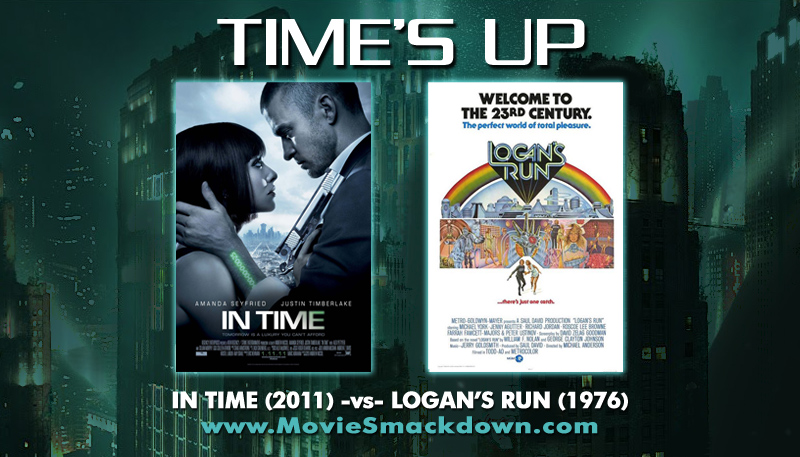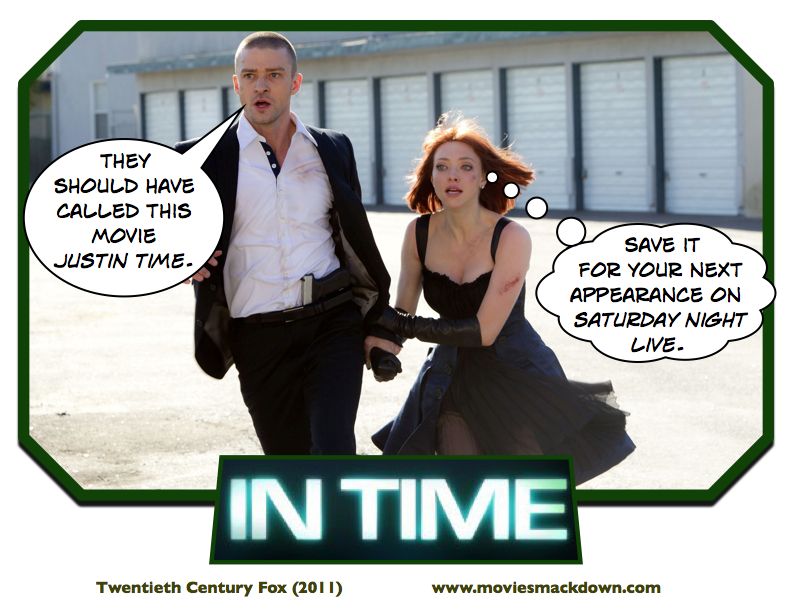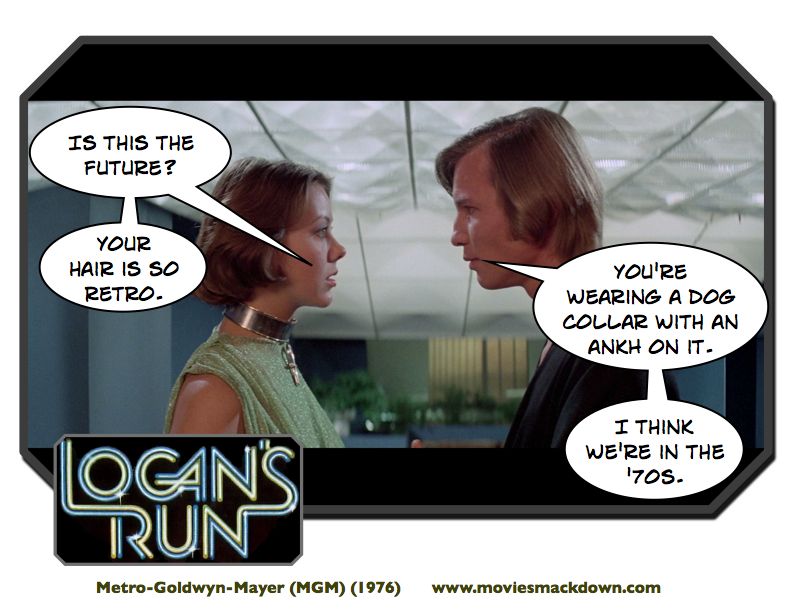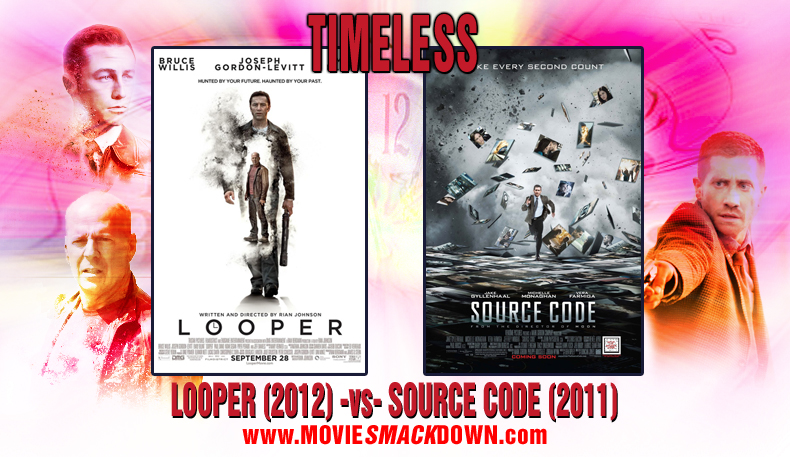
The Smackdown
You are advised to read this quickly! Time is running very, very short and we’ll all be dead soon. That’s because in the worlds presented by this Smack’s two contenders, all humans are programmed to expire at an extremely young age. The unfortunate folk populating our challenger, In Time, are in the worse position of the two, having a base life-limit of 26 years. At least those occupying the hermetically sealed 23rd century metropolis in our reigning champ, 1976’s Logan’s Run, get almost half a decade extra — they’re expected to off themselves at the ripe old age of 30.
The idea of a race of young, vibrant people is certainly appealing to Hollywood, which operates essentially just that way. The only slight catch is that anyone marginally older is either eliminated (in the case of Logan) or programmed to die on their 26th birthday unless they somehow acquire extra years or even centuries (In Time).
We don’t have a moment to waste. Tick, tick, tick go our life clocks. Read on to see who’ll survive this Smackdown and get to stretch out their existence a little longer.
 The Challenger
The Challenger
As if it weren’t bad enough that most people only live until their mid-20s, the society of In Time is also kept in widespread, grinding poverty by a powerful elite. Many of the unfortunates live like our hero Will Salas (Justin Timberlake), working menial blue-collar jobs and scraping and scheming to win extra hours of life through means legal or otherwise. Currency doesn’t exist; instead, goods and services are paid for with time. And because said time is taken directly from an individual’s own life limit, people tend to buy only the necessities, like alcohol and coffee for example, with, presumably, nary a minute spent on things we consider current-day must-haves, like movie downloads.
On the plus side, science has managed to stop the aging gene at 25, so for those lucky enough to extend their time limit past the usual one-year grace period, the benefits are immense. Will’s mom, for example, is sufficiently young-looking to be played by the gorgeous Olivia Wilde (who in real life is actually younger than Timberlake).
One night, a man who has acquired hundreds of years of extra time makes his way into the downtrodden zone where Will and his ilk live. Our hero saves the man from a mugging by local thug Fortis (Alex Pettyfer). Regardless, the man has lost his will to exist and commits suicide the next day, but not before transferring his extravagant life span to Will. This brings the unwanted attention of the police, in the presence of a determined “timekeeper†played by Cillian Murphy, who launches a relentless chase. Undeterred, Will attempts to get to the heart of elite society and determine who’s really responsible for keeping life spans artificially low, so he can right this immense wrong once and for all.
 The Defending Champion
The Defending Champion
Logan’s Run is presented, at least at first, from the opposite side of the law. The main character, Logan 5, is a “sandman,†i.e., a cop tasked with hunting down and killing “runners†who attempt to escape their limited society and its mandatory self-destruction at age 30. After tracking and killing yet another runner, Logan discovers on the dead scofflaw an amulet in the form of a mysterious symbol (at least to him – it’s a common ankh). The computer that controls and regulates the society informs him this is the symbol of a resistance movement. Harsh taskmaster that it is, the computer then assigns Logan to track down and uncover the movement’s sanctuary, hidden somewhere beyond the sealed city. Ominously, the timepiece begins to flash, signifying that Logan’s end is about to come rapidly.
Instead of looking for the sanctuary in order to destroy it, Logan searches for it to save himself from an early demise. Aiding him in his quest is the fetching Jessica 6 (Jenny Agutter). Logan must overcome the best efforts of fellow sandman and former friend Francis 7 (Richard Jordan), as he tries to escape the compound and destroy the computer and its death-grip on his society,
The Scorecard
Despite Logan’s cachet among fans of science fiction, neither of these films can truly be considered a classic of its genre. In Time suffers from a general humorlessness and a simplistic, rich-people-are-scheming-and-evil approach in its portrayal of the antagonists. The bad guys are the usual wealthy, privileged elite who have nothing better to do than squash and control everyone who isn’t like them. This is a tired, lazy way to pack a movie full of opposition.  It’s also been done countless times before, and with more flair and wit than in this movie. Frankly, we expect better from writer/director Andrew Niccol, who burst onto the scene with 1997’s well received Gattaca.
The theme is hammered relentlessly from the beginning, at the expense of story or character development. There are few twists or surprises here, particularly considering that its central conceit is strong and the setting potentially fascinating. Timberlake’s a charming actor but has yet to show he’s enough of a presence to carry a film. Which is almost beside the point, as Will’s character is so flat that John Gielgud couldn’t have brought him to life. Timberlake’s character is also slightly jarring as an action hero, driving like a stunt performer in several scenes and effortlessly dispatching a pack of bad guys in another. As he’s set up as a fairly straightforward blue-collar guy who never leaves his neighborhood, it’s hard to buy him as a sci-fi Steve McQueen or Bruce Lee.
Logan’s Run also gets lazy in the bad guy category — evil computers will take over the world! (It was made in the mid-1970s, after all). Unlike our challenger, it suffers from a lack of commitment — the lead actors don’t seem to be trying too hard, and we get the impression of talented people showing up to get a paycheck. But there’s a scruffy, low-tech charm to the proceedings (come on, how can anyone dislike those Disneyesque, World of Tomorrow-style scale models of the compound?) Also, its story is more crisp and compelling because it’s not weighed down with an obvious, elite-few-vs.-underprivileged-many theme.
The Decision
In Time is one of those movies where an audience feels every minute of the nearly two-hour running time, particularly toward the end, where the proceedings should be getting faster and more engaging. Instead, it just can’t let go of its obsession with economic privilege. If Niccol was so determined to get a political/economic message across, he would have been better off doing so with subtle narrative strokes and detail, rather than a theme that suffocates the movie like a moldy old blanket. (Or, he should have used a telegram, as Sam Goldwyn once famously advised.)
Logan’s Run writer David Zelag Goodman, whose own time-clock, sadly, ran out in September, just weeks after the remake of his best known film Straw Dogs (co-written with Sam Peckinpah) was released, sets the film’s computer bad guy up simply and efficiently in the opening 20 minutes. Boom, job done. In this story (adapted from the book by William F. Nolan and George Clayton Johnson), Logan takes off, and we’re on a light, breezy ride until he escapes, then returns to Do The Right Thing. Although the special effects don’t date very well and the actors’ performances don’t either, it’s still fun to watch these characters scuttle around and escape their fates. Logan’s Run will probably never make anyone’s top ten list, but unlike In Time, it’s an enjoyable waste of precious life time. As such, it’s the winner of this Smackdown.





This is on my top ten list indeed! ! I watch it every day on my copy downloaded into my cell phone. I also signed a successful petition to get the TV series released as well! ! You are a hack writer who doesn’t know what’s he’s talking about! ! This is one of the greatest movies ever made. Especially for the Sci Fi genre! ! Runner:” You are terminated!!
Actually plot for the movie “In time” reminds me of one story from comic book “Mandrake”. Magician visits another planet where people are living just like that, buying time.
Both movies are awesome. In Time shows up how far we’ve come in our own ambivalence towards the plight of our fellow humans. If time really was money and people showed such indifference to “how long others had left” then bring on the end. I have to believe that people of conscience couldn’t stand by and simply let others die.
While Logan’s Run introduced the whole perfect world, beautiful people euthanasia debate. There was even a brief spin off TV series from that one. Post apocalyptic appreciation of art and history and culture etc etc (oh and of cats ;p). Utterly brilliant and just as reminiscent in the conclusion of “The Island” as that of “In Time”.
Both wonderful comments on the mindset of society, both then and now. Not under-card contenders at all.
Nicely put. For me, the concept in both is stronger than the execution in either, making them both good but not quite great films.
Hmmm perhaps you are right. What does cut it as a great movie though?
It’s like these two movies are part of the undercard but not the championship fight.
An overly irritating message movie versus a film made about a future that never was that has dated badly.
Sigh…
Even so… this post got the most traffic of anything all weekend… congrats Eric!